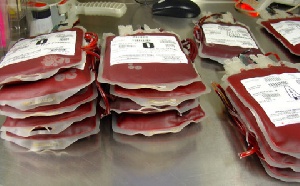Mr Collins Ntim, Member of Parliament for Offinso North, has urged Ghanaians to voluntarily donate blood to save lives, as the world marks World Blood Donor Day.
“World Blood Donor Day held on June 14 every year, has played a major role in promoting the goal of self-sufficiency in blood supply based on voluntary, unpaid donors around the world,” Mr Ntim said in a statement on the floor of Parliament.
The focus of this year’s World Blood Donor Day campaign is “Safe Blood for Saving Mothers.” The day raises awareness of the need for safe blood products, and to thank voluntarily unpaid blood donors for their life-saving gifts of blood.
Mr Ntim noted that noted there is a high rate of deaths, due to blood loss, as a result of severe bleeding during delivery and childbirth, in addition to morbidity and long-term disability.
According to the MP, who is also the Deputy Ranking Member of the Parliamentary Select Committee on Health, the Global Database on Blood Safety (GDBS) for the year 2012 says almost all of these deaths occur in developing countries, which Ghana is not exempted.
The risk for maternal mortality is highest for adolescent girls under 15 years of age. Mr Ntim noted, however, that “access to safe and sufficient blood and blood products and the rational and safe use of blood transfusion still remain major challenges in many countries around the world.”
He called for the provision of safe and adequate blood to be made an integral part of every country’s national health care policy and infrastructure. “All countries need a regular supply of blood. In low income countries, the biggest demand is for blood transfusions to treat severe anaemia in children under five years old, and to manage pregnancy related complications,” Mr Ntim stressed.
Mr Joseph Yieleh Chiereh (NDC-Wa West), in a contribution, suggested the formation of blood donation clubs for voluntary blood donation and the development of products to cater for people whose religious beliefs would not allow them to accept blood transfusion.
Health News of Monday, 16 June 2014
Source: GNA

















